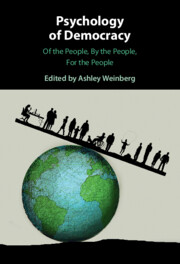Book contents
- Psychology of Democracy
- Psychology of Democracy
- Copyright page
- Contents
- Figures
- Tables
- Contributors
- Preface
- Acknowledgements
- Chapter 1 Psychology of Democracy
- Part I Of the People
- Chapter 2 Personality, Politics and Strong Democracy
- Chapter 3 From Big Ben to the Breakfast Table
- Chapter 4 Under the Microscope:
- Chapter 5 Cognitive Complexity:
- Chapter 6 In ‘A League of Their Own?’
- Chapter 7 The Mental Well-Being of Politicians
- Part II By the People
- Part III For the People
- Index
- References
Chapter 6 - In ‘A League of Their Own?’
Judgement and Decision-Making by Politicians and Non-Politicians
from Part I - Of the People
Published online by Cambridge University Press: 24 February 2022
- Psychology of Democracy
- Psychology of Democracy
- Copyright page
- Contents
- Figures
- Tables
- Contributors
- Preface
- Acknowledgements
- Chapter 1 Psychology of Democracy
- Part I Of the People
- Chapter 2 Personality, Politics and Strong Democracy
- Chapter 3 From Big Ben to the Breakfast Table
- Chapter 4 Under the Microscope:
- Chapter 5 Cognitive Complexity:
- Chapter 6 In ‘A League of Their Own?’
- Chapter 7 The Mental Well-Being of Politicians
- Part II By the People
- Part III For the People
- Index
- References
Summary
Are there systematic differences between the behaviour of politicians – such as ministers, members of parliament or elected municipal council members – and that of ‘the rest of us’? Are politicians in a ‘league of their own’ in terms of how they take decisions and make judgements? In the existing literature, there is no overriding consensus or clear majority of findings on these questions. We add to this literature by leveraging results from an experiment with two samples: (1) Dutch locally elected politicians (n = 211) and (2) students (n = 260). The experiment examined whether these two groups displayed biases related to the representativeness heuristic and the availability heuristic – two so-called general purpose heuristics – and whether they displayed the reflection effect. Our findings demonstrate that politicians’ judgements and decisions are largely similar to those of the rest of us, indicating that there is little evidence of an elite-public gap in this respect. Under specific circumstances, however, politicians do differ in their judgement and decision making. These differences may have consequences for the functioning of representative democracy and for policy making. It is especially noteworthy that in this study political experience or expertise did not reduce decision-making biases.
Keywords
- Type
- Chapter
- Information
- Psychology of DemocracyOf the People, By the People, For the People, pp. 124 - 145Publisher: Cambridge University PressPrint publication year: 2022



